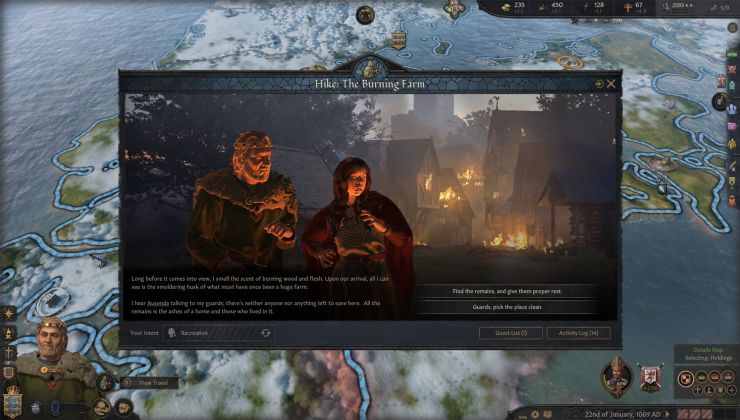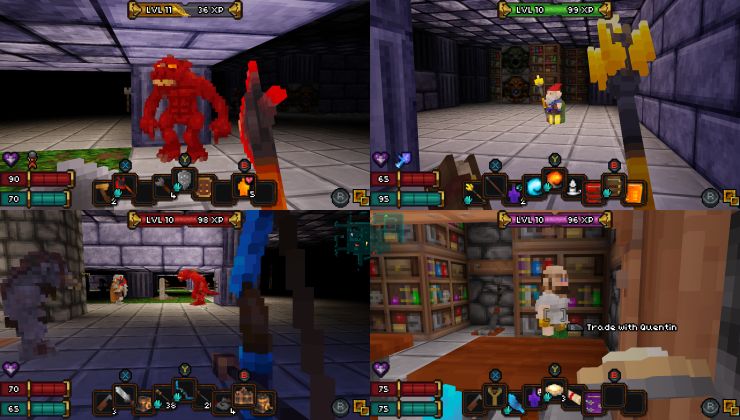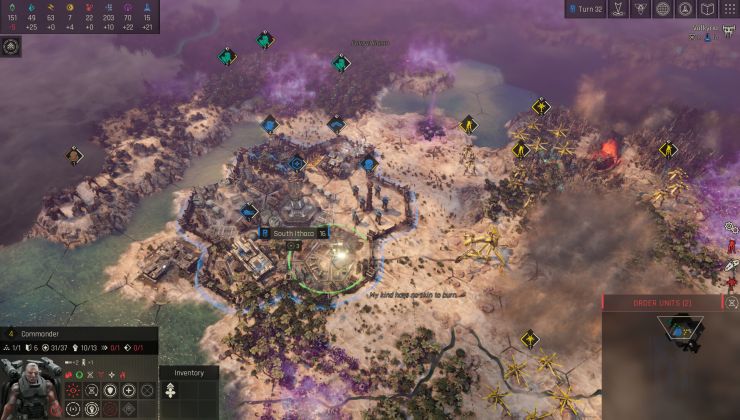Has it really been that long? Apparently so. Valve originally announced their rebranding of Steam Play with Proton back on August 21st, 2018. Seems like a good time for a quick reflection being halfway to a decade old now.
The problem: before, during and just after the original Steam Machine push developers just weren't porting many games to Linux, and on the whole really when you look back Linux gaming was in a period of mostly stagnation. Nothing much was happening. A lot of the early porting work that came along was slowly dying off since the Steam Machines didn't provide the boost Valve and Linux gamers were hoping for.
Originally, “Steam Play” simply meant you could buy a game on Steam and get access to all versions of it. So if you purchased a game on Windows, you could play it on Linux if it had a Native Linux version (same again for macOS). Clearly though, that wasn't enough for what Valve had planned. So if Valve wanted to make Linux a better platform for people to actually use it, they needed something more.
Popular games needed to be able to run on Linux if more people were to use it, because what good is a platform for gaming if tons of the most played games weren’t compatible? As Valve saw with the Steam Machines (not the only reason of course) it doesn’t end well.
I remember being sat in my office at the time, going over my TODO list of various articles and games to cover, planning the week ahead. Ready to then probably go to bed and then BAM — out of nowhere this announcement comes along from Valve that basically said “you're going to be hella busy, better get a lot of coffee”. Valve had partnered up with CodeWeavers and Proton was the answer.
Proton being the name Valve gave to their fork of Wine with a bunch of added extras, and it has changed Linux gaming forever. Steam Play is more than just Proton though, be sure to read my full Steam Play Proton guide. Side-note: John Carmack (id Software / Oculus VR / Keen Technologies) even thought Wine was the solution back in 2013.
Of course Proton wouldn't have been possible without all the many years of work that went into the Wine project in the first place, and everyone who contributed to Wine should be applauded for their effort. Valve has funded a lot of extra work though to get things like DXVK and VKD3D-Proton for the translation from Direct3D to Vulkan into a state where performance can be really great! Valve also funds work on Linux graphics drivers, Linux kernel work and the list goes on.
Just how much has Proton changed things though? Well, we certainly wouldn't have the Steam Deck if it wasn't for Proton. There's no way Valve would have released their handheld without as many games as possible, clearly learning their lesson on the failure of the Steam Machines. But as we all know, the Steam Machines burned so Proton and the Steam Deck could rise from the ashes.
Proton just makes a lot of sense. It didn't take long for Valve to expand Proton to go initially from a few select Valve-approved titles, to being able to run anything we choose to try with it. From there, Linux gaming just seemingly exploded. And then eventually we saw why Valve made Proton with the Steam Deck announcement coming less than three years later in July 2021.
When you look at the crowd-sourced reports on ProtonDB over 11,000 titles are reported to work by multiple people. It's a small fraction of Steam's overall game count but ProtonDB relies on people actually going and writing a report.
Valve's own Deck Verified rating system just for the Steam Deck hit plenty of milestones since the Steam Deck's release too, now having over 10,000 titles rated to be Playable or Verified. Although both ProtonDB and Deck Verified include a mixture of Native Linux releases and Windows games run with Proton. The point is - being on Linux now for a gamer means quite often a huge amount of your games do actually "just work". It's almost magical.
The real number of games playable on Linux will never be truly known though, because on Steam there's many tens of thousands of games and a lot of them will likely "just work" with Proton if they don’t have a Native Linux build available…and many more are releasing every week. This is a truly incredible place to be in. When you think about Linux and Steam Deck together having just less than a 2% user share on Steam overall — these are some insane numbers for game compatibility for a niche platform.
Thanks to Proton, I've been able to discover a ton of new favourite games, some I would never have played before. Games like Deep Rock Galactic, God of War, Death Stranding, Baldur’s Gate 3, Brotato, Beat Saber and so on. You get the idea, there’s a truly ridiculous selection of games available and at times it’s a little paralysing scrolling through my Steam Library deciding what to play — a delightfully annoying problem to have huh?
 Pictured - Baldur's Gate 3, shot taken on Kubuntu
Pictured - Baldur's Gate 3, shot taken on Kubuntu
Gamers using Linux (be it desktop or Steam Deck) in 2023 are now in a place where they can get excited alongside friends who use Windows or traditional consoles, because they know there's a good probable chance at release that whatever new exciting game coming out will work without much trouble.
Proton is far from perfect though and it does mean in a few ways that Valve, CodeWeavers and everyone else working on it are playing catch-up with Microsoft on compatibility and whatever changes Microsoft suddenly decides to announce that affects gaming. That, and how many different ways game developers can abuse various APIs to do things in weird ways. Valve and co are a dedicated bunch though, constantly fixing up issues from AAA games like ELDEN RING where Valve quickly worked to implement optimizations, same again for problems with Dead Space to the likes of PooShooter: Toilet Invaders (what a fun highlight that was eh?). There's also the constant third-party launcher breakage, that Valve are also fixing up each time it happens.
Valve produce updates to Proton constantly to improve compatibility, with over 300 revisions to the main changelog (although some a minor text corrections) it's clear to see how much work goes into it. With various new main versions of Proton through 4, 5, 6, 7 now onto 8 and multiple updates to Proton Experimental almost every month.
So here's to Proton, the magnificent tech that allows playing all kinds of games across Linux systems from desktop to Steam Deck and wherever else you decide to stick Linux. Nice one Valve. Cheers.
Quoting: PenglingTo be fair, the Humble Bundle in its early days also made great steps toward Linux gaming by requiring each game in the bundle to be ported to Mac and Linux. Granted it was indie games at the time, but there were also up-and-coming devs like Frozenbyte and Runic games. Another great contribution to Linux gaming was that they published figures on what each platform paid on average for the games, revealing Linux gamers were eager to pay more to support the effort.Quoting: Liam DaweDon’t even get me started on the people trying to claim things were good pre-Steam 🤣The best pre-Steam thing that I can point to was the massive progress made on emulation, driven by stuff like the GP2X (an obscure Linux-based Korean handheld with awful controls because the company didn't know the gaming space very well) and similar machines, which ultimately came into its own later when those same emulators got ported to the Raspberry Pi and making emulation-boxes became a hugely popular first project.
Prior to that, people would insist that you needed to install Windows XP for a good emulation experience, whereas today Linux is considered the go-to by just about everybody. But emulation is understandably niche, so it was never going to drive Linux gaming adoption alone.
Obviously that was nowhere near Valve's contribution, but I have fond memories of those days.
Quoting: omer666To be fair, the Humble Bundle in its early days also made great steps toward Linux gaming by requiring each game in the bundle to be ported to Mac and Linux. Granted it was indie games at the time, but there were also up-and-coming devs like Frozenbyte and Runic games. Another great contribution to Linux gaming was that they published figures on what each platform paid on average for the games, revealing Linux gamers were eager to pay more to support the effort.True! Also a most excellent pre-Steam thing!
Obviously that was nowhere near Valve's contribution, but I have fond memories of those days.
I remember the figures being published - they were quite revealing about both Linux and Mac users. I remember this being written by a Mac-focussed game-developer around that time too, and to the best of my knowledge it looks like the same behaviours recorded back then still hold true today.
Quoting: pleasereadthemanualACK! So sorry, I forgot to quote you before!Quoting: PenglingWell, on the subject of Affinity Suite, progress is actually pretty good:Quoting: pleasereadthemanualAdobe Suite in Wine would be nice...I know some folks who are waiting for the Affinity suite to work nicely under Wine, too, so that they can drop MacOS in favour of Linux. Hopefully one day!
I use Affinity sometimes but unfortunately can't replace the Adobe suite fully with it. I also need to use Descript sometimes...
- https://forum.affinity.serif.com/index.php?/topic/182758-affinity-suite-v204-on-linux-wine/
- https://forum.affinity.serif.com/index.php?/topic/166159-affinity-photo-running-on-linux-with-bottles/
From my understanding, Adobe Suite was previously supported in Wine—Google even paid for a GSoC to maintain that support many years ago. The DRM is the biggest reason it doesn't work anymore. I have a feeling that if they could get the DRM working, CodeWeavers would find it worthwhile to get Adobe Suite working in CrossOver.
Quoting: rustybroomhandleHumble Bundle, remember they used to have keys for Steam, their own store and.... Desura. Remember Desura?Hard to forget, neither really changed all that much for us though. Humble ports weren't exactly great, and many left broken. Desura also died rather quickly.
Quoting: rustybroomhandleHumble Bundle, remember they used to have keys for Steam, their own store and.... Desura. Remember Desura?
Quoting: Liam DaweHard to forget, neither really changed all that much for us though. Humble ports weren't exactly great, and many left broken. Desura also died rather quickly.Never bought anything there, but I haven't heard Desura mentioned in donkey's years, and yet today I've heard it mentioned three times!
Last edited by Pengling on 22 August 2023 at 11:49 am UTC
Quoting: PenglingHappy if it helps. It's still in the early stages and I think they're only focused on getting Affinity 2+ to work, which I don't own yet (or ever?). Some of the information was compiled into this codeberg repository which hasn't been updated for a while but should give you the step-by-step process, apparently: https://codeberg.org/wanesty/affinity-wine-docsQuoting: pleasereadthemanualACK! So sorry, I forgot to quote you before!Quoting: PenglingWell, on the subject of Affinity Suite, progress is actually pretty good:Quoting: pleasereadthemanualAdobe Suite in Wine would be nice...I know some folks who are waiting for the Affinity suite to work nicely under Wine, too, so that they can drop MacOS in favour of Linux. Hopefully one day!
I use Affinity sometimes but unfortunately can't replace the Adobe suite fully with it. I also need to use Descript sometimes...
- https://forum.affinity.serif.com/index.php?/topic/182758-affinity-suite-v204-on-linux-wine/
- https://forum.affinity.serif.com/index.php?/topic/166159-affinity-photo-running-on-linux-with-bottles/
From my understanding, Adobe Suite was previously supported in Wine—Google even paid for a GSoC to maintain that support many years ago. The DRM is the biggest reason it doesn't work anymore. I have a feeling that if they could get the DRM working, CodeWeavers would find it worthwhile to get Adobe Suite working in CrossOver.Many many thanks for this info - I'll pass it along!
Quoting: pleasereadthemanualit seems to be because Soft Denchi wants to register a watchdog service that runs at all times from system boot on Windows. It seems to require privileged access based on an ActiveX control (?) that Wine can't provide—Nightmare fuel.
Not sure if you touched on this in previous posts but are streaming services for, or browser based, JDM visual novels a thing? It seems to be a good match if you want to be (over) protective of your games?
Quoting: whizseI assume JDM stands for "Japanese Domestic Market", and thanks—that's a good way of distinguishing them from localized Japanese visual novels.Quoting: pleasereadthemanualit seems to be because Soft Denchi wants to register a watchdog service that runs at all times from system boot on Windows. It seems to require privileged access based on an ActiveX control (?) that Wine can't provide—Nightmare fuel.
Not sure if you touched on this in previous posts but are streaming services for, or browser based, JDM visual novels a thing? It seems to be a good match if you want to be (over) protective of your games?
Browser-based visual novels are indeed a thing over at novelgame.jp, but from where I stand, they're actually a pretty cool thing. You have the option of playing them in your browser or downloading a Windows executable. All the games, as far as I'm aware, are completely free but you can tip the creators if you want. I see it as a cool thing because they haven't done away with downloads altogether, the browser-based version isn't DRM'd at all, and you can play the game on any computer with a modern browser (even a cellphone).
I first learned about this site when I was putting together the comfysnug wiki pages—I learned a lot of things from all that research, haha.
I remember hearing about DMM Game Player requiring the player to be always-online. Specifically, here's the Fuwanovel thread about it: https://forums.fuwanovel.net/topic/20271-drm-in-dmm-games/#comment-480810
QuoteDMM does have DMM Game Player, which is an incredibly annoying, super restrictive form of DRM. If the game you want uses this, then chances are you cannot hook it. You can not play the game offline, and you must launch it from the DMM Game Player lancher.Personally, I stopped buying from DMM the instant I realized the games were encumbered by Soft Denchi, which didn't work in Wine. I only started playing JDM visual novels after becoming a Linux user, so thankfully I don't have some giant library of DMM games holding me on Windows...
Note that these users are discussing Text Hooking, which is where you use a program like Textractor to inject hooks into the game to copy the Japanese text. Once you copy the Japanese text, you can paste it into a dictionary (or use something like Yomichan) to look up an unknown word. It's much harder to look up the word otherwise; if you don't know how the word is read, you'd have to use OCR, try to write the Kanji with the correct stroke order, or choose radicals off the screen on jisho.org. If OCR doesn't work (it's like 70% accurate), it's a laborious process.
DMM Game Player and other DRM can prevent you from injecting hooks. As I hope you understand from the explanation above, this becomes a huge pain in the ass for Japanese learners even on Windows.
In fact, since this comment has already become a DMM hit piece, I'll add that you need a Japanese IP address at some point between purchasing the game and activating it in order to play the game. Not always or consistently, but reliably enough that I need to mention it in the comfysnug wiki Buying guide.
DLsite is a cool alternative store where some games are encumbered by PlayDRM, which actually does work in Wine, some still use Soft Denchi (geh), and some have no DRM at all. No DRM! They also have an English interface and a For-Women section. Not as many visual novels here, but a good selection.
English localizers historically encumbered their visual novels in the exact same way as DMM; MangaGamer even used Soft Denchi at one point. But today, no English localizers sell visual novels encumbered by DRM—Johren is the sole exception. If you ask me, every English localizer abandoned DRM for a reason, and I don't think Johren is going to win this fight. I can only hope a similar seachange happens in Japan.
Sorry for the length...I tried to keep my previous comments brief but, well, you opened a can of worms haha.
Quoting: InstallThat is cool and all but I vastly prefer Native games.
Yeah, we do too, but again, it's the chicken or the egg problem all over again.
Are there gonna be native games for a non-existent market ? Probably not. Can't really blame editors/devs (Feral has done a great job at native ports nevertheless).
Wine/Proton made a significant enough market emerge, are there gonna be (way more) native games from now on ? Probably.










See more from me